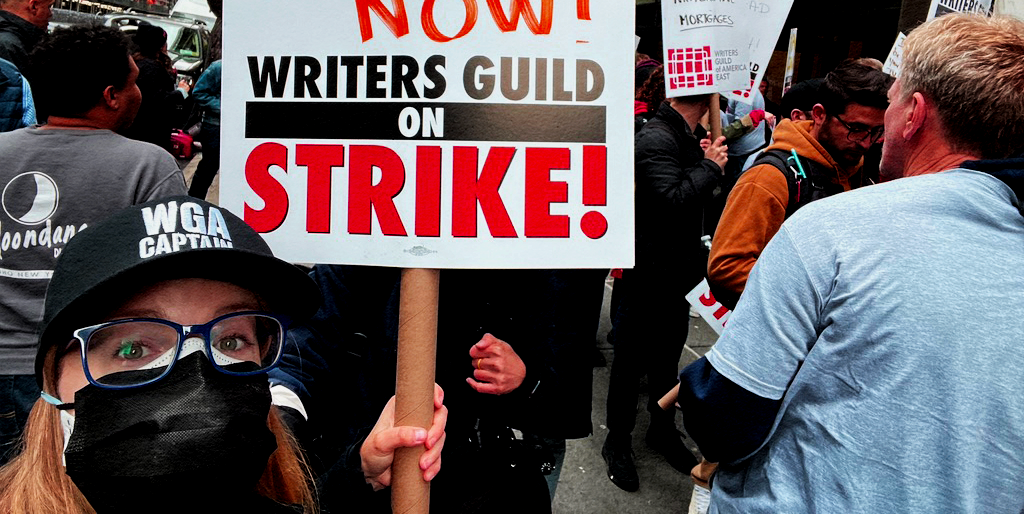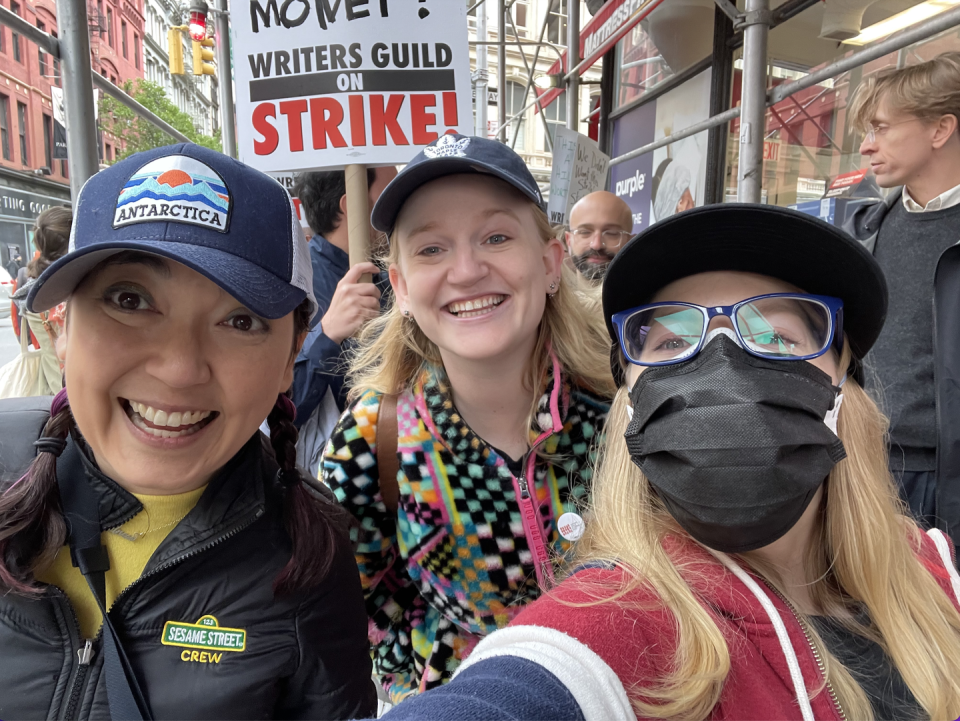The Fabulous Life of Your Friendly Neighborhood Striking TV Writer

- Oops!Something went wrong.Please try again later.
For the last 8 years, I’ve been a professional TV writer in New York City, with credits on The Nightly Show With Larry Wilmore, an upcoming FX limited series, and a couple of projects in development. I love getting paid to write about issues that matter to me, and I also like getting paid to write fart jokes. I’m pretty good at my job, especially the fart jokes.
But the reality of writing for TV is not the caviar-snorting, celeb-hobnobbing fantasy we, ironically, see on TV. When I’m in a writers’ room, it feels magical. But those months of magic are often followed by a year or more of piecing together non-TV gigs, working for free to develop projects that probably won’t ever get made, and stressing about losing my health insurance if I don’t meet the income minimum to keep my union coverage. And I really need health insurance, because in 2009 I received a kidney from my aunt (it was a transplant, not, like, a weird Christmas gift), and I swore I’d take good care of it. Oh, and in 2019, I had cancer (I’m okay now).
Unfortunately, the era of streaming combined with corporate greed has turned what was already a tightrope walk for writers into a tightrope walk above a volcano while riding a unicycle and balancing a poodle on your pinkie. Even as there’s more quality TV to consume than ever before, writers feel increasingly squeezed by our working conditions—fewer writers staffed on shows, far shorter seasons, frequent cancellations, and very little security. To try to regain some sense of stability, the Writers Guild of America— representing 11,500 writers—had no choice but to go on strike when the AMPTP (the organization that represents the studios) walked away from contract negotiations on May 1. We hope that by withholding our labor, we can force the AMPTP to make a fair deal so we can all get back to work. Fun fact: We have no idea how long that will take or when we will be paid again!
So now I’m on strike, in what is a very intense unpaid job as a union organizer I have no training for. Here’s what’s a week in my life looks like now:
Monday
One week in and I’m worried my dog is starting to hate me. The same thing happened when I had cancer. I would leave for a week to get chemo and he—being a dog—assumed I was abandoning him forever. Since the pandemic hit, I’ve worked exclusively from home. Now that I’m gone for four to eight hours a day picketing around NYC, he is not amused. Apparently, worker solidarity is lost on Griffin. Don’t worry, I’ve assigned him reading—Karl Marx’s Capital is up first. And I give him a treat before I leave—I’m not a monster!

Every day, we march and chant outside the studio buildings, their corporate offices, and on-location shoots. Picket lines are a great way to keep up morale and improve your circle-walking skills. They also serve a practical purpose: Many crew members from other unions—like the Teamsters and IATSE (the union representing crew members)—refuse to cross picket lines. No TV crew = no productions, which costs the studios money. Because they love money, we hope this will bring them back to the negotiating table sooner. Ideally, before my health insurance expires or my bank account hits zero! And certainly before Griffin learns how to read.
When I arrive at Broadway Stages in Greenpoint, Brooklyn, everyone is fired up because the studios won’t even discuss our proposals, including really basic ones like “Don’t let the robots replace us.” Yep! Since AI is basically a mother bird regurgitating a half-digested mishmash of material, the WGA proposed that it couldn’t be used to write scripts that human writers would eventually have to fix anyway, just at a fraction of our usual wages. I think that’s a fair request, but then again, I’m not a CEO or a robot mother bird.
By the end of the day, I’m wiped. I still continue to answer calls, emails, and texts from my fellow organizers and writers until I pass out around midnight. One of my friends refers to this feeling as “being a browser with too many open tabs.” I call it “banana pudding brain.”
Picketing tip: Beware the sun. To that end, UV gloves are, apparently, a thing, and they make you look like a stylish striking magician!
Step Count: 20,451
Tuesday
On the picket line at Silvercup Studios in Queens this morning, late-night writers are a big part of the crowd. Over the years, the WGA has fought to ensure TV writers get certain protections, like minimum weekly rates and, in the late-night world, the guarantee that jobs will last at least 13 weeks at a time (which, let’s be real, is one extremely mature 7th grade romance). But while some of those protections made it to streaming, we haven’t been able to get them for late-night writers yet. So if you write for Late Night With Seth Meyers on NBC, the broadcast network, you’re protected, but if you work on The Amber Ruffin Show, on NBC’s streaming service Peacock, you’re not. Look, the best comedy does not come from economic insecurity! It comes from emotional insecurity.

Banana pudding brain sets in until I get home to the Upper West Side (okay, maybe one of the clichés about writers is true…), turn on the Calm app, and fall asleep when I hear the words, “Take a deep—”
Picketing tip: Make the circle switch directions after each hour—your hips will thank you.
Step count: 24,260
Wednesday
When I arrive at the Amazon/HBO picket line in Hudson Yards, it’s become a full-on rally complete with a live band courtesy of The Late Show (on hiatus because of the strike) and righteous indignation courtesy of Mandy Patinkin. Mandy’s sign says, “You killed residuals, prepare to pay,” referring to (The Princess Bride and also) the fact that writers receive residual checks when networks re-air their shows, but on streaming, these checks are teeny-tiny (like two whole dollars). Streamers base residuals on a low flat fee instead of on, say, how many views a show gets. So a writer on Bridgerton doesn’t share in its massive, swoonworthy, bodice-ripping success. Money! Who needs it?!
Mandy Patinkin: “Without writers we have nothing!” #WritersGuildStrike @WGAEast pic.twitter.com/5lx4sKw6JT
— WGA East vp Lisa Takeuchi Cullen (@LisaCullen) May 10, 2023
This loss of income hits hard. Writers need to earn a little over $40,000 a year in WGA-covered work in order to qualify for health insurance. When you’re in between jobs, residuals are supposed to help you cover that gap. Without those checks—and as someone who’s a “regular” at my hospital—I’m pretty much constantly calling the insurance company to see when my coverage expires and what I need to do to keep it (“Can I write for you, insurance adjuster!? Maybe your kid’s 8th grade graduation speech? Is that Guild-covered?!”).
After wrapping at Amazon/HBO, a few of us head over to a smaller picket nearby which has successfully delayed production on Billions, which is especially apt given that’s how much revenue the studios bring in (even while they refuse to settle on a contract that will cost them less than a mere percent of that figure). Other fittingly named shows we’ve successfully delayed production on: American Horror Story and Evil.
Picketing tip: Earplugs (one word: megaphones)
Step Count: 18,480
Thursday
Not only do I need to take two trains and a bus to get to Steiner Studios in the Brooklyn Navy Yards, it’s so huge (bring a bike!) it takes me 20 minutes to find the entrance. After introducing myself to my fellow picketers and trading notes on mutual friends, I realize this is the most consistent socializing I’ve done since the pandemic began. By the end of this, we’ll all be extroverts with incredibly toned quads. The studios are just making us stronger!
I get home via the usual labyrinthine route just in time to hop on back-to-back organizing Zoom meetings about how to make our pickets even more effective and how other groups can show solidarity. I am exhausted but powered by the support from our fellow workers who are also feeling the squeeze and want us to succeed. We vow to support them in their struggle too. Tonight, Dolly Parton’s “9 to 5” is my lullaby.
Picketing tip: Start your day with a union-themed Wordle guess. I’ve been rotating through: UNION, POWER, VALUE, and STAND.
Step count: 23,643
Friday
When I leave this morning, Griffin just looks at me with disappointment and heartbreak. “Blame the studios!” I whisper. But even though he understands words like “sit,” “high five,” and “dinnertime,” he doesn’t know “corporate greed”...yet.
Today, I’m shooting a video with some friends to explain the strike via jokes (sadly, none fart-related). I only mostly hate how my face looks and my voice sounds (I’m a writer!), but I think we get the message across: billionaire CEOs = bad; fair deal = good. And I manage to get to the picket in the afternoon, and help our staff members close out in the evening after a big week.
Maybe it’s the banana pudding brain talking, but I’ve been thinking. I’ve worked so hard and walked the equivalent of two literal marathons this week for no pay. But what’s the difference between that and putting in endless free writing to pitch a show that has a 0.1% chance of getting made? Yeah, I’m going to need to take on more freelance jobs outside of TV to pay the bills during this strike, but I did that before too! These last few years, we’ve all been haphazardly trying to build a semblance of a life. I wonder if the companies have realized that in making this career so unsustainable, they’ve actually positioned us perfectly to outlast them. Those fools! Workers across industries know this feeling. We are all suffering from profit-growth-driven economics. We all deserve to be compensated for our labor and to share in the profits of what we create! Writers are asking for just that.
And, sure, Griffin hated me when I did chemo. But because I did it, I survived, giving myself the chance to earn his love again (mostly via treats). So he may hate me now, but by striking, my career will survive too, and I’ll get the chance to earn his love again (also mostly via treats).
Bring on week three.
Picketing tip: Backup sneakers for when your current sneakers lose their tread in… five days.
Step count: 20,051
Total step count for the week: 106,885
Total step count for the strike: TBD—you can come back to the negotiating table anytime, studios!
You Might Also Like

